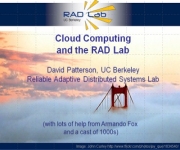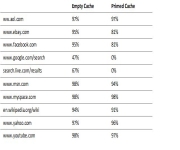Archive For The “Services” Category

Dave Patterson did a keynote at Cloud Futures 2010. I wasn’t able to attend but I’ve heard it was a great talk so I asked Dave to send the slides my way. He presented Cloud Computing and the Reliable Adaptive Systems Lab. The Berkeley RAD Lab principal investigators include: Armando Fox, Randy Katz & Dave…
Standards and benchmarks have driven considerable innovation. The most effective metrics are performance-based. Rather than state how to solve the problem, they say what needs to be achieved and leave the innovation open. I’m an ex-auto mechanic and was working as a wrench in a Chevrolet dealership in the early 80. I hated the emission…
Mike Stonebraker published an excellent blog posting yesterday at the CACM site: Errors in Database Systems, Eventual Consistency, and the CAP Theorem. In this article, Mike challenges the application of Eric Brewer’s CAP Theorem by the NoSQL database community. Many of the high-scale NoSQL system implementers have argued that the CAP theorem forces them to…
Every so often, I come across a paper that just nails it and this one is pretty good.. Using a market Economy to Provision Resources across a Planet-wide Clusters doesn’t fully investigate the space but it’s great to progress on this important area and the paper is a strong step in the right direction. I…
I love eventual consistency but there are some applications that are much easier to implement with strong consistency. Many like eventual consistency because it allows us to scale-out nearly without bound but it does come with a cost in programming model complexity. For example, assume your program needs to assign work order numbers uniquely and…
MySpace makes the odd technology choice that I don’t fully understand. And, from a distance, there are times when I think I see opportunity to drop costs substantially. But, let’s ignore that, and tip our hat to the MySpace for incredibly scale they are driving. It’s a great social networking site and you just can’t…
Last week, I posted Scaling Second Life. Royans sent me a great set of scaling stories: Scaling Web Architectures and Vijay Rao of AMD pointed out How FarmVille Scales to Harvest 75 Million Players a Month. I find the Farmville example particularly interesting in that it’s “only” a casual game. Having spent most of my…
As many of you know I collect high-scale scaling war stories. I’ve appended many of them below. Last week Ars Technica published a detailed article on Scaling Second Life: What Second Life can Teach your Datacenter About Scaling Web Apps. This article by Ian Wilkes who worked at Second Life from 2001 to 2009 where…
Cloud computing is an opportunity to substantially improve the economics of enterprise IT. We really can do more with less. I firmly believe that enterprise IT is a competitive weapon and, in all industries, the leaders are going to be those that invest deeply in information processing. The best companies in each market segment are…
There were three big announcements this week at Amazon Web Services. All three announcements are important but the first is the one I’m most excited about in that it is a fundamental innovation in how computation is sold. The original EC2 pricing model was on-demand pricing. This is the now familiar pay-as-you-go and pay-as-you-grow pricing…
I’m on the program committee for the ACM Symposium on Cloud Computing. The conference will be held June 10th and 11th 2010 in Indianapolis Indiana. SOCC brings together database and operating systems researchers and practitioners interested in cloud computing. It is jointly sponsored by the ACM Special Interest Group on Management of Data (SIGMOD) and…
HPTS has always been one of my favorite workshops over the years. Margo Seltzer was the program chair this year and she and the program committee brought together one of the best programs ever. Earlier I posted my notes from Andy Bectolsheim’s session Andy Bechtolsheim at HPTS 2009 and his slides Technologies for Data Intensive…
Last week AWS announced the Amazon Relational Database Service (Amazon RDS) and I blogged that it was big step forward for the cloud storage world: Amazon RDS, More Memory, and Lower Prices. This really is an important step forward in that a huge percentage of commercial applications are written to depend upon Relational Databases. But,…

Recently I came across Steve Souder’s Velocity 2009 presentation: High Performance Web Sites: 14 Rules for Faster Loading Pages. Steve is an excellent speaker and the author of two important web performance books: · High Performance Web Sites · Even Faster Web Sites The reason this presentation caught my interest is it focused on 1)…
I’ve worked on our around relational database systems for more than 20 years. And, although I freely admit that perfectly good applications can, and often are, written without using a relational database system, it’s simply amazing how many of world’s commercial applications depend upon them. Relational database offerings continue to be the dominant storage choice…
Jeff Dean of Google did an excellent keynote talk at LADIS 2009. Jeff’s talk is up at: http://www.cs.cornell.edu/projects/ladis2009/talks/dean-keynote-ladis2009.pdf and my notes follow: · A data center wide storage hierarchy: o Server: § DRAM: 16GB, 100ns, 20GB/s § Disk: 2TB, 10ms, 200MB/s o Rack: § DRAM: 1TB, 300us, 100MB/s § Disk: 160TB, 11ms, 100MB/s o Aggregate…